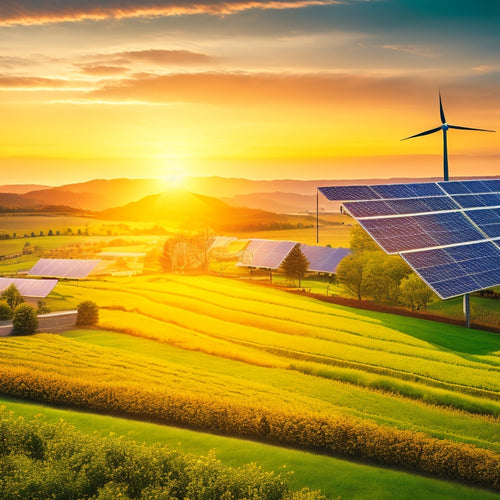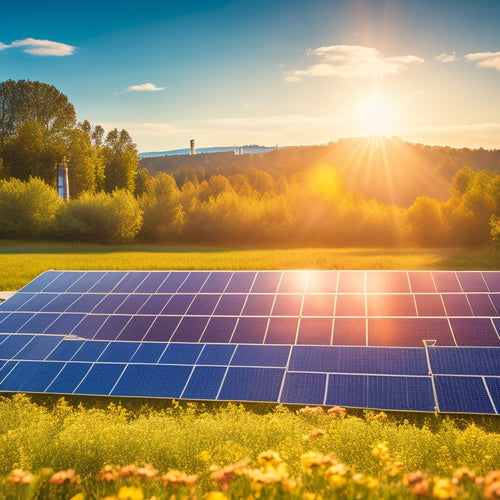
Affordable Home Energy Solutions for Homeowners
Share
You're seeking affordable home energy solutions that can markedly reduce your reliance on the grid and lower your energy bills. Solar power provides a clean and sustainable alternative, with renewable installations becoming increasingly accessible for homeowners. Average installation costs range from $15,000 to $30,000, but incentives like tax credits and rebates can considerably offset these costs. Additionally, financing options like loans and community solar programs can reduce upfront expenditures. By evaluating panel efficiency, performance, and storage solutions, you can maximize energy savings and achieve energy independence. Now, learn how to tailor a solar solution that fits your budget and energy needs.
Overview
- Financing options like loans, power purchase agreements, and community solar programs offer low upfront costs for solar panel installation.
- Government incentives, such as federal tax credits and state/local rebates, significantly reduce the financial burden of adopting solar energy.
- Energy storage solutions like solar batteries provide backup power during outages and enhance energy independence, with costs ranging from $5,000 to $15,000.
- Smart inverters and energy management systems optimize energy production, facilitate real-time monitoring, and support grid stability.
- Regular cleaning and ideal panel angle/direction maximize solar energy output, leading to increased savings and reduced reliance on traditional energy grids.
Solar Power for Homes
You're considering solar power for your home, and rightly so. With the increasing awareness of climate change and energy independence, renewable installations like solar power are becoming a popular choice.
Solar energy offers a clean and sustainable alternative to traditional fossil fuels, reducing your carbon footprint and reliance on the grid. Additionally, solar incentives such as tax credits and rebates can greatly offset the initial investment, making it a more accessible option.
Affordable Solar Panel Options
You're likely wondering how to make solar energy a more affordable option for your home. The cost of solar panels is a considerable factor, and it's crucial to evaluate the upfront investment versus the long-term savings.
When assessing affordable solar panel options, you'll want to take into account not only the cost but also the panel's efficiency, as it can greatly impact the overall value of your system.
Additionally, the type and quality of equipment high-quality equipment can make a considerable difference in the performance and cost of your system.
Solar Panel Costs
Solar panel costs have decreased dramatically over the years, making renewable energy a more viable option for homeowners. As you consider switching to solar, it's important to understand the costs involved.
The average cost of solar installation varies between $15,000 and $30,000, depending on the system size and quality. Fortunately, financing solar options are available, such as loans and power purchase agreements, which can make the shift more affordable.
You can also benefit from solar installation trends, like community solar programs and solar leasing, which allow you to access renewable energy without the upfront costs.
Additionally, combining solar panels with solar battery storage systems can enhance energy reliability and provide long-term savings. With the cost of solar battery storage systems ranging from $5,000 to $15,000 or more, it's important to weigh the benefits against the initial investment.
Panel Efficiency Matters
As you investigate the world of affordable solar panel options, it's vital to reflect on the efficiency of the panels themselves, since even slight variations in performance can greatly affect your energy output and savings over time.
High-efficiency panels, for instance, can enhance energy output by up to 45% via optimized angles and tilt Future-Proofing Home Power Systems, which is especially important during low sunlight periods.
You'll want to take into account the panel's efficiency rating, typically measured in percentage terms. A higher rating indicates more energy generated per unit area. For instance, a 20% efficient panel will produce more energy than a 15% efficient one of the same size.
When evaluating panel performance, look for high-efficiency models that can maximize your energy output. This guarantees you get the most bang for your buck and achieve greater energy independence.
DIY Solar Installation Guide
Your decision to take charge of your solar installation is a wise one, saving you thousands of dollars in labor costs. With careful planning and attention to detail, you can successfully install your solar panels.
First, verify you have a solid understanding of local building codes and permits required for your project. Next, prepare your roof by clearing debris and verifying it's structurally sound.
When handling solar panels, always wear protective gear, including gloves and safety glasses, and consider enlisting a friend to assist with heavy lifting. Follow solar installation tips, such as connecting panels in series and parallel, and securing them to your roof with durable fasteners.
Solar Battery Storage Solutions
You're looking for a reliable way to store excess energy generated by your solar panels, and solar battery storage solutions can provide that.
With these solutions, you'll have an efficient energy backup during power outages or at night, and a renewable power source that reduces your reliance on the grid.
Efficient Energy Backup
While shifting to renewable energy sources, homeowners often overlook a critical component: efficient energy backup. You need a reliable system to store excess energy generated by your solar panels during the day for use during power outages or at night.
Solar battery storage solutions provide an efficient energy backup, ensuring you have power when you need it. These energy storage systems can be paired with backup generators to provide a seamless changeover during outages.
With efficient energy backup, you'll experience fewer interruptions and reduced reliance on the grid, giving you more freedom and control over your energy usage.
Renewable Power Source
The heart of any renewable energy system lies in its power source, and solar battery storage solutions are at the forefront of this technology.
You've likely considered utilizing wind energy or investigated geothermal heating for your home, but solar power remains the most accessible and cost-effective option.
Solar battery storage solutions allow you to store excess energy generated during the day for use during the night or on cloudy days. This means you can rely less on the grid and more on your own clean energy.
With advancements in technology, solar battery storage solutions have become more efficient and affordable, making them an attractive option for homeowners seeking freedom from reliance on traditional energy sources.
Grid Independence Options
Frequently, homeowners seeking energy independence turn to solar battery storage solutions as a reliable means of reducing their reliance on the grid.
With the ability to store excess energy generated from solar panels or wind energy, you can power your home during the night or on cloudy days. This allows you to enjoy the benefits of renewable energy while minimizing your dependence on the grid.
By integrating a solar battery storage system into your home, you'll have a backup power source during outages, reducing the risk of lost productivity and food spoilage.
Achieve energy independence and take control of your energy needs with a reliable solar battery storage solution.
Incentives for Home Solar Systems
Government rebates and tax credits can greatly slash the upfront cost of installing a home solar system, making it a more accessible option for environmentally conscious homeowners like you.
You can benefit from federal tax credits, which currently cover up to 26% of the total installation cost. In addition, state rebates and local incentives can also reduce the cost.
Financing options, such as solar lease agreements, allow you to install a system with little to no upfront cost. Community solar programs also offer a shared solar experience.
Moreover, you can enjoy net metering benefits, which credit you for excess energy produced. Finally, energy efficiency programs can provide additional savings.
Maximizing Solar Energy Savings
By leveraging the incentives mentioned earlier, you've taken the first step towards utilizing solar energy.
Now, it's time to maximize your solar energy savings. To do this, make sure your solar panels are installed at an ideal angle and direction to capture maximum sunlight.
Regularly clean your panels to maintain their efficiency. Also, consider upgrading to a smart inverter, which can enhance energy production and monitoring.
By adopting these sustainable energy practices, you'll be able to generate more electricity and reduce your reliance on the grid.
Additionally, consider energy storage solutions, like batteries, to store excess energy for later use.
Frequently Asked Questions
Can I Install Solar Panels on a Shaded Roof?
You can install solar panels on a shaded roof, but it'll impact solar efficiency. Shading reduces energy output, so assess your roof's shading patterns to determine the best panel placement for maximizing energy production.
Do Solar Panels Increase My Home's Insurance Cost?
You'll likely see a slight increase in your home's insurance cost after installing solar panels, as they're considered a high-value addition. An insurance evaluation will determine the new premium, and policy adjustments will be made to reflect the added value, potentially increasing your annual cost.
Are Solar Panels Damaged by Heavy Snowfall?
Ah, you're worried snowflakes will crush your solar dreams? Fear not, as most panels are designed to withstand snow accumulation. In fact, a gentle snowfall can even clean your panels, enhancing solar efficiency - but heavy snowfall may require a quick roof clearing, so get ready to shovel!
Can I Use Solar Power for My Electric Vehicle?
You can charge your electric vehicle with solar power, releasing EV benefits like reduced emissions and lower operating costs. By installing a solar charging system, you'll utilize renewable energy and fuel your daily commutes sustainably.
Will Solar Panels Void My Roof's Warranty?
When you install solar panels, you're likely wondering if it'll void your roof's warranty. Fortunately, a reputable solar installation won't automatically void your warranty, but you'll need to review the terms and guarantee the installer follows manufacturer guidelines to maintain warranty validity.
Ready to Buy
By now, you've seen how solar power can alter your home's energy environment. But can you really afford to wait any longer to capture the sun's energy? With affordable solar panel options, DIY installation guides, and lucrative incentives, the question is, what's holding you back? By investing in solar power, you're not only reducing your carbon footprint but also padding your wallet with significant energy savings.
Related Posts
-

Net Metering in Renewable Energy's Future
Net metering's future is vital for driving renewable energy growth and financial savings. You can reduce your electri...
-

Advantages of Solar Generating Systems Over Traditional Energy
Solar generating systems provide several key advantages over traditional energy sources. You'll experience lower long...
-

Top 10 Off Grid Camping Gear Must-Haves
When you're off-grid camping, the right gear is crucial for a smooth expedition. Start with a durable, weather-resist...


